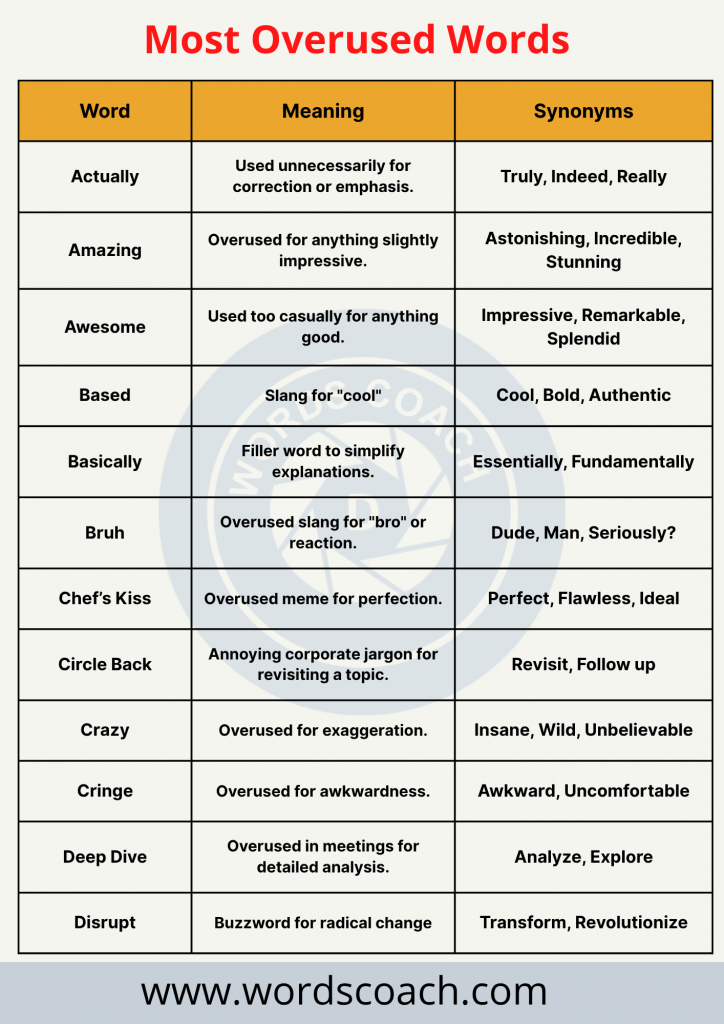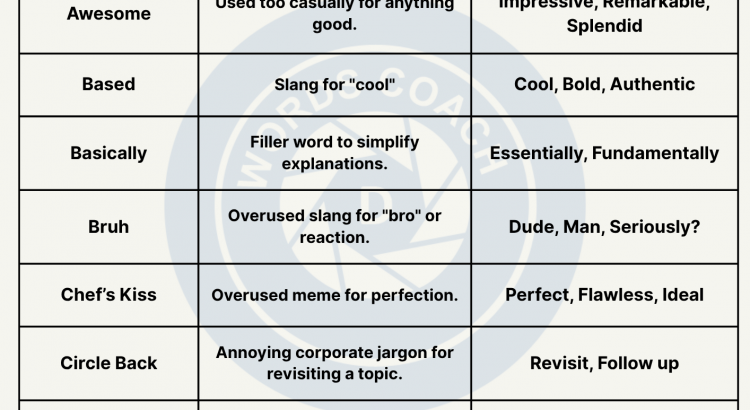Most Overused Words
Have you ever read a sentence that felt… dull or repetitive? Chances are, the culprit was one of the many overused words in English. While these words aren’t inherently wrong, using them too often can make your writing sound bland or lazy. Whether you’re writing an email, an essay, or even a social media post, knowing which words to limit can take your language from meh to memorable.
Most Overused Words
Very
Why it’s overused:
“Very” is often used to intensify adjectives or adverbs but usually ends up weakening the sentence. Saying “very tired” is less vivid than “exhausted.”
Try instead:
- Very happy → thrilled
- Very cold → freezing
- Very big → enormous
Really
Why it’s overused:
Much like “very,” “really” adds little emphasis and often clutters sentences. It’s filler more than force.
Try instead:
- Really important → crucial
- Really fast → rapid
- Really nice → delightful
Just
Why it’s overused:
“Just” is frequently used to soften statements or add hesitation. In excess, it dilutes clarity and confidence.
Try instead:
- “I just wanted to ask…” → “I wanted to ask…”
- “Just checking in…” → “Checking in…”
Literally
Why it’s overused:
Often used for dramatic effect, but ironically, it’s rarely literal. Misusing “literally” can confuse or annoy readers.
Try instead:
Use “literally” only when you mean something is true in a literal sense—not for exaggeration.
Amazing
Why it’s overused:
“Amazing” has become the go-to word for anything slightly enjoyable. Its meaning has been watered down.
Try instead:
- Incredible
- Astounding
- Fascinating
- Delightful
Thing
Why it’s overused:
“Thing” is vague and lacks specificity. Strong writing relies on precise nouns.
Try instead:
- “The thing is…” → “The issue is…”
- “This thing helps with…” → “This tool aids in…”
Stuff
Why it’s overused:
“Stuff” is another catch-all word that adds little value. It’s acceptable in speech but weak in writing.
Try instead:
- Equipment
- Materials
- Belongings
- Content
Awesome
Why it’s overused:
Overused in casual speech and writing, “awesome” has lost its awe. It now sounds generic.
Try instead:
- Outstanding
- Remarkable
- Superb
- Impressive
Nice
Why it’s overused:
“Nice” is vague and subjective. It doesn’t convey the true nature of what’s being described.
Try instead:
- Pleasant
- Kind
- Generous
- Elegant
Get/Got
Why it’s overused:
“Get” is one of the most versatile verbs, but overusing it can weaken your expression.
Try instead:
- Get better → recover/improve
- Got angry → became furious
- Get the idea → understand
Most Overused Words In English
| Word | Meaning (Why Overused) | Synonyms (Better Alternatives) |
|---|---|---|
| Actually | Used unnecessarily for correction or emphasis. | Truly, Indeed, Really |
| Amazing | Overused for anything slightly impressive. | Astonishing, Incredible, Stunning |
| Awesome | Used too casually for anything good. | Impressive, Remarkable, Splendid |
| Based | Slang for “cool” (overused in Gen Z). | Cool, Bold, Authentic |
| Basically | Filler word to simplify explanations. | Essentially, Fundamentally |
| Bruh | Overused slang for “bro” or reaction. | Dude, Man, Seriously? |
| Chef’s Kiss | Overused meme for perfection. | Perfect, Flawless, Ideal |
| Circle Back | Annoying corporate jargon for revisiting a topic. | Revisit, Follow up |
| Crazy | Overused for exaggeration. | Insane, Wild, Unbelievable |
| Cringe | Overused for awkwardness. | Awkward, Uncomfortable |
| Deep Dive | Overused in meetings for detailed analysis. | Analyze, Explore |
| Disrupt | Buzzword for radical change (overused in startups). | Transform, Revolutionize |
| Epic | Overused for dramatic effect. | Legendary, Monumental |
| Furthermore | Overused in formal writing. | Additionally, Moreover |
| Gaslighting | Often misused for manipulation. | Manipulating, Deceiving |
| Gatekeeping | Overused in online debates. | Restricting, Excluding |
| Growth Hacking | Buzzword for marketing strategies. | Strategic marketing, Optimization |
| Honestly | Overused to sound sincere. | Truthfully, Frankly |
| Iconic | Overused for minor things. | Legendary, Famous |
| Innovative | Overapplied to anything new. | Original, Groundbreaking |
| Just | Weakens requests (“Can you just…?”). | Simply, Merely |
| Leverage | Corporate jargon for “use.” | Utilize, Employ |
| Like | Filler word in speech. | (Remove or use “such as”) |
| Literally | Misused for emphasis. | Truly, Actually (or remove) |
| Love/Hate | Overused casually. | Adore/Despise, Strongly like/dislike |
| Mindfulness | Overused in wellness culture. | Awareness, Presence |
| Moreover | Redundant in writing. | Furthermore, Additionally |
| Perfect | Overused in responses. | Ideal, Flawless |
| Pivot | Overused in business for change. | Shift, Adapt |
| Really | Weakens emphasis. | Truly, Extremely |
| Red Flag | Overused in dating discourse. | Warning sign, Concern |
| Rizz | Gen Z slang for charm (overused). | Charisma, Charm |
| Seriously | Overused for emphasis. | Genuinely, Truly |
| Slay | Overused for impressive actions. | Excel, Dominate |
| So | Overused in speech (“so tired”). | Extremely, Incredibly |
| Struggle | Overused for minor issues. | Difficulty, Challenge |
| Sus | Overused slang for suspicious. | Shady, Doubtful |
| Synergy | Overused corporate jargon. | Collaboration, Cooperation |
| Thought Leader | Overused in professional branding. | Expert, Influencer |
| Unbelievable | Overused hyperbolically. | Astonishing, Incredible |
| Utilize | Pretentious for “use.” | Use, Employ |
| Very | Weakens descriptions. | Extremely, Exceptionally |
| Vibes | Overused for feelings/atmosphere. | Atmosphere, Aura |
Filler Words (Often Used Unnecessarily)
- Like – Used excessively in speech as a filler.
- Literally – Often misused for emphasis.
- Basically – Overused to simplify explanations.
- Actually – Frequently inserted unnecessarily.
- Honestly – Overused to sound sincere.
- Seriously – Used for exaggerated emphasis.
- Just – Often overused in requests (“Can you just…?”).
- Really – Overused for emphasis (“That’s really cool”).
- Very – Weakens descriptions (e.g., “very good” vs. “excellent”).
- So – Overused in speech (“I was so tired”).
Buzzwords (Trendy & Overused in Media/Business)
- Synergy – Overused in corporate jargon.
- Disrupt – Used excessively in startup culture.
- Innovative – Applied too broadly.
- Leverage – Overused in business contexts.
- Growth Hacking – Buzzword in marketing.
- Mindfulness – Overused in wellness culture.
- Pivot – Overused in business strategy.
- Thought Leader – Overused in professional branding.
- Deep Dive – Overused in meetings.
- Circle Back – Annoying corporate phrase.
Casual Overused Words (Everyday Speech)
- Awesome – Overused to describe anything good.
- Amazing – Used too often for minor things.
- Crazy – Overused for exaggeration.
- Unbelievable – Often used hyperbolically.
- Perfect – Overused in responses (“That’s perfect!”).
- Epic – Overused for dramatic effect.
- Hate/Love – Used too casually (“I hate Mondays”).
- Struggle – Overused for minor inconveniences.
- Bruh – Overused in slang.
- Vibes – Overused to describe feelings.
Academic & Formal Overused Words
- Furthermore – Overused in essays.
- Moreover – Often redundant in writing.
- In order to – Wordy (just use “to”).
- At this point in time – Redundant (use “now”).
- Utilize – Overused when “use” suffices.
Internet & Social Media Slang
- Slay – Overused for anything impressive.
- Iconic – Used too often for minor things.
- Chef’s Kiss – Overused meme phrase.
- Gatekeeping – Overused in online debates.
- Gaslighting – Often misused.
- Red Flag – Overused in dating discourse.
- Cringe – Overused to describe anything awkward.
- Based – Overused slang for “cool.”
- Sus – Overused for anything suspicious.
- Rizz – Overused Gen Z slang for charm.
Language is a powerful tool, and the words you choose can make or break your message. Overused words are like worn-out shoes—they still work, but they lack impact. By replacing these common culprits with more precise, vibrant vocabulary, you’ll elevate your writing, engage your readers, and communicate with clarity and style.
Want to Learn More?
| Word Coach Quiz/Game | C2 Vocabulary Exercise | B1 Vocabulary Exercises |
| B2 Vocabulary Exercise | A2 Vocabulary Exercise | A1 Vocabulary Exercise |
Download Word Coach Application






